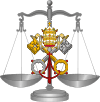Procurator (canon law)
 |
| Part of a series on the |
| Jurisprudence of Catholic canon law |
|---|
|
|
|
Trials and tribunals |
|
Canonical structures Particular churches
|
|
|
In the canon law of the Catholic Church, a procurator is one who acts on behalf of and by virtue of the authority of another.[1] Bishops have been represented at councils by procurators, as Saint Peter Canisius attended the Council of Trent as procurator for the Bishop of Augsburg.[2]
Description
Religious institutes, societies of apostolic life and autonomous particular Church may have representatives resident in Rome acting on their behalf in business they may have with the Holy See.[1]
Within such institutes of consecrated life and societies of apostolic life, the person charged with matters such as the purchase of provisions, furniture, books and other supplies may be called a procurator.[1] This officer may be called a provincial procurator or a procurator general, if looking after the needs of a province or of the institute as a whole. In other institutes, the terms used may be bursar or econome.
A party to litigation may generally appoint a procurator instead of responding personally.[3]
The name "fiscal procurator" or "fiscal promoter" was previously used in canon law[4] for the official known since the publication of the 1917 Code of Canon Law as the promoter of justice and whose function is to safeguard the public welfare in cases brought before ecclesiastical tribunals.[5] In canonization cases, the corresponding official was called the promoter of the faith or, in popular parlance, the devil's advocate.
See also
References
- 1 2 3 John Hardon, Modern Catholic Dictionary
- ↑ John Coulson, The Saints: A Concise Bibliographical Dictionary
- ↑ Code of Canon Law, Book VII, Part I, Title IV, Chapter II: "Procurators for Litigation and Advocates"
- ↑ Joseph Laurentius, "Fiscal Procurator" in Catholic Encyclopedia (1909
- ↑ Sebastian S. Karambai, Ministers and Ministries in the Local Church (St Pauls BYB 2005 ISBN 9788171097258), pp. 112-114